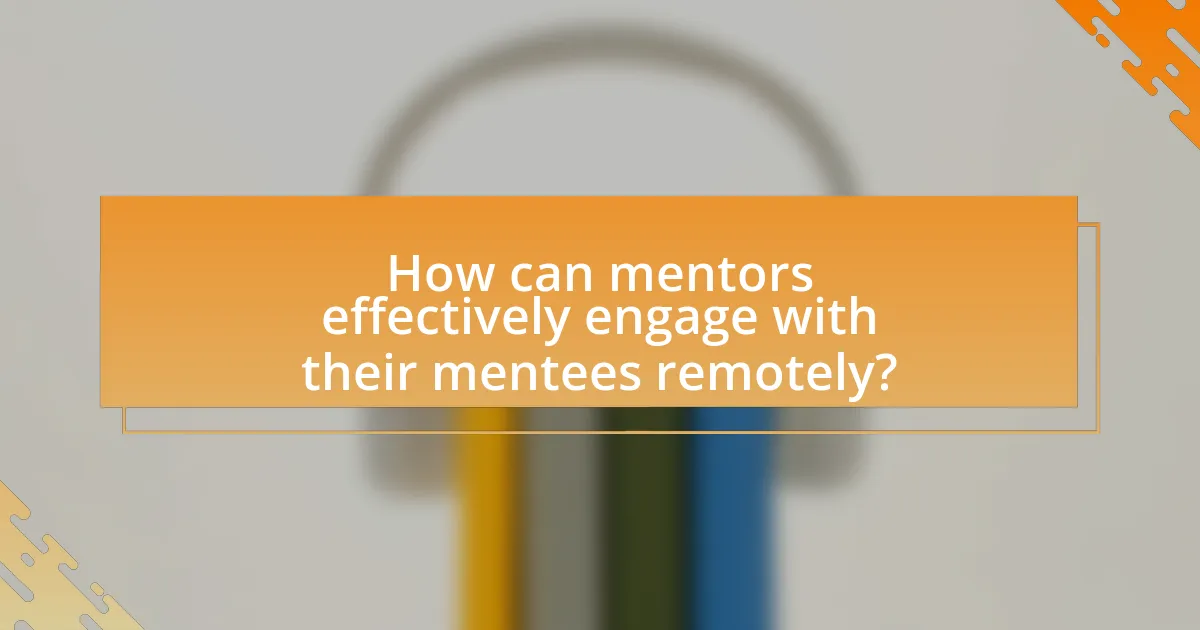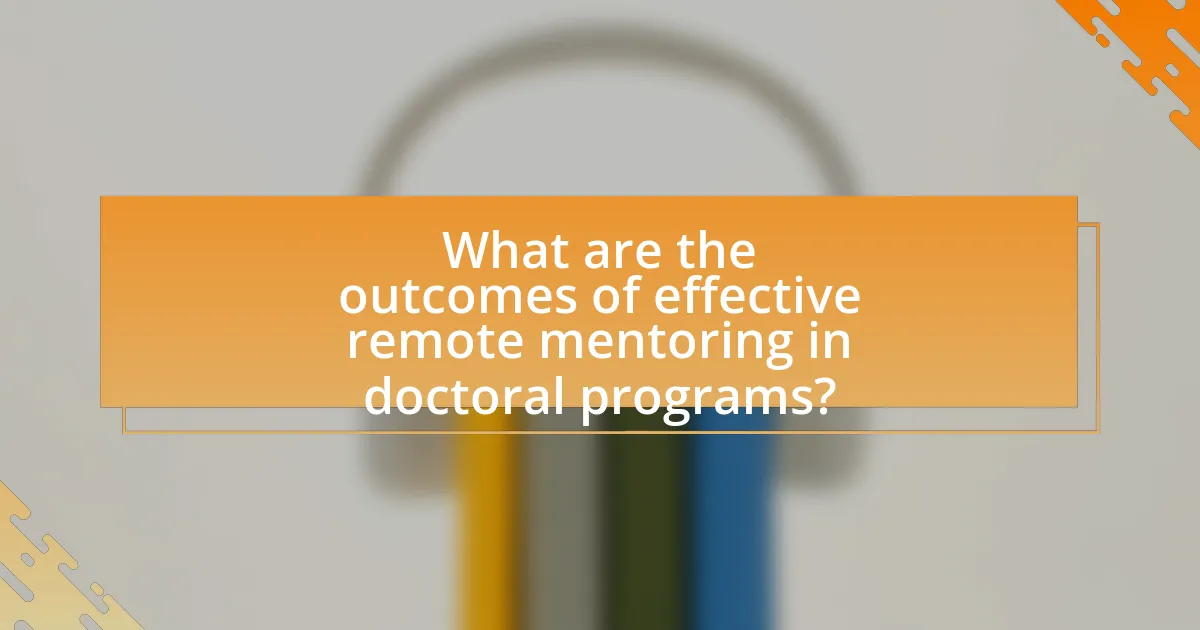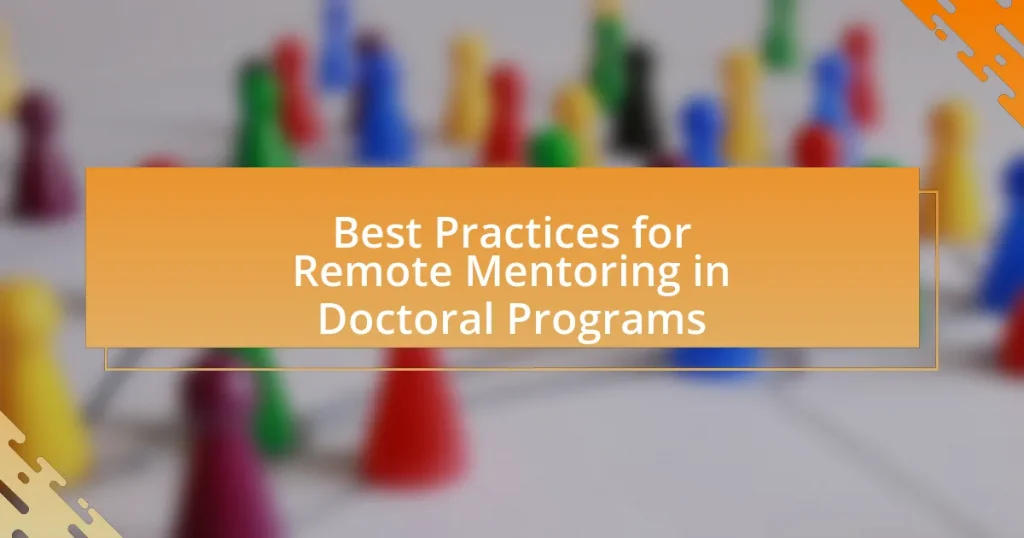The article focuses on best practices for remote mentoring in doctoral programs, emphasizing the importance of clear communication, regular check-ins, and structured feedback to enhance the mentoring experience. It outlines how remote mentoring can improve academic performance and student satisfaction by providing flexible access to expert guidance. Key elements of effective remote mentoring include the use of appropriate technology, personalized approaches, and strategies to build rapport and overcome communication barriers. The article also addresses challenges faced in remote settings and offers practical tips for mentors to foster engagement and support the diverse needs of their mentees.

What are the Best Practices for Remote Mentoring in Doctoral Programs?
The best practices for remote mentoring in doctoral programs include establishing clear communication channels, setting regular check-ins, and providing structured feedback. Clear communication channels, such as video calls and messaging platforms, facilitate effective interaction between mentors and mentees. Regular check-ins, ideally scheduled weekly or bi-weekly, help maintain engagement and accountability. Structured feedback, which should be timely and specific, allows doctoral candidates to understand their progress and areas for improvement. Research indicates that these practices enhance the mentoring experience and contribute to higher satisfaction and success rates among doctoral students.
How can remote mentoring enhance the doctoral experience?
Remote mentoring can enhance the doctoral experience by providing flexible access to expert guidance and support. This flexibility allows doctoral candidates to connect with mentors regardless of geographical barriers, facilitating diverse perspectives and expertise that may not be available locally. Research indicates that remote mentoring can lead to improved academic performance and increased satisfaction among doctoral students, as it fosters a sense of community and belonging through regular interactions. A study published in the “International Journal of Doctoral Studies” found that students engaged in remote mentoring reported higher levels of motivation and engagement, which are critical for successful completion of doctoral programs.
What are the key elements of effective remote mentoring?
The key elements of effective remote mentoring include clear communication, structured goals, regular feedback, and the use of appropriate technology. Clear communication ensures that both mentor and mentee understand expectations and objectives, which is crucial in a remote setting where non-verbal cues are limited. Structured goals provide a roadmap for the mentoring relationship, allowing both parties to track progress and stay focused. Regular feedback fosters continuous improvement and helps address any issues promptly, enhancing the learning experience. Finally, the use of appropriate technology, such as video conferencing tools and collaborative platforms, facilitates interaction and resource sharing, making the mentoring process more efficient and engaging. These elements are supported by research indicating that effective mentoring relationships significantly improve academic outcomes for doctoral students.
How does remote mentoring differ from traditional mentoring?
Remote mentoring differs from traditional mentoring primarily in its reliance on digital communication tools rather than face-to-face interactions. In remote mentoring, mentors and mentees utilize platforms such as video conferencing, emails, and messaging apps to communicate, which can enhance accessibility and flexibility. This mode allows participants from diverse geographical locations to connect, potentially increasing the diversity of perspectives and experiences shared. Additionally, remote mentoring often requires a more structured approach to communication and goal-setting, as the lack of physical presence can lead to misunderstandings if not managed effectively. Studies indicate that remote mentoring can be as effective as traditional methods when clear expectations and regular check-ins are established, highlighting the importance of intentionality in the mentoring process.
What challenges do mentors and mentees face in remote settings?
Mentors and mentees face several challenges in remote settings, primarily including communication barriers, lack of personal connection, and difficulties in establishing trust. Communication barriers arise from reliance on digital tools, which can lead to misunderstandings and reduced clarity in discussions. The lack of personal connection often results from the absence of face-to-face interactions, making it harder for mentors and mentees to build rapport and engage effectively. Additionally, establishing trust can be more challenging in a virtual environment, as non-verbal cues are often lost, and the informal interactions that typically foster trust are limited. These challenges can hinder the overall effectiveness of the mentoring relationship in doctoral programs.
How can communication barriers be overcome in remote mentoring?
Communication barriers in remote mentoring can be overcome by utilizing clear and consistent communication tools, establishing regular check-ins, and fostering an open environment for feedback. Effective use of video conferencing platforms, instant messaging, and collaborative tools ensures that both mentors and mentees can share information seamlessly. Regular check-ins, scheduled weekly or bi-weekly, help maintain engagement and clarify expectations. Additionally, creating a culture where feedback is encouraged allows for the identification and resolution of misunderstandings promptly, enhancing the overall mentoring experience.
What strategies can be employed to build rapport remotely?
To build rapport remotely, effective strategies include regular communication, active listening, and personalized interactions. Regular communication fosters a sense of connection; for instance, scheduling weekly check-ins can help maintain engagement and accountability. Active listening demonstrates genuine interest in the mentee’s concerns and ideas, which can be achieved by summarizing their points and asking follow-up questions. Personalized interactions, such as acknowledging significant milestones or tailoring discussions to the mentee’s interests, enhance the relationship by making the mentee feel valued. Research indicates that these strategies significantly improve mentor-mentee relationships, leading to better outcomes in remote mentoring contexts.
What tools and technologies support remote mentoring?
Tools and technologies that support remote mentoring include video conferencing platforms, collaborative document editing tools, and project management software. Video conferencing platforms like Zoom and Microsoft Teams facilitate real-time communication and interaction, essential for effective mentoring. Collaborative document editing tools such as Google Docs allow mentors and mentees to work together on projects and share feedback instantly. Project management software like Trello or Asana helps in organizing tasks and tracking progress, ensuring that mentoring objectives are met efficiently. These tools enhance the mentoring experience by providing structured communication and collaboration opportunities, which are critical in remote settings.
Which platforms are most effective for remote mentoring sessions?
The most effective platforms for remote mentoring sessions are Zoom, Microsoft Teams, and Google Meet. These platforms facilitate real-time communication, screen sharing, and collaborative tools, which are essential for effective mentoring. Research indicates that Zoom is widely preferred for its user-friendly interface and robust features, with a 2021 survey showing that 76% of educators favor it for online learning environments. Microsoft Teams integrates seamlessly with Office 365, making it ideal for academic settings, while Google Meet offers easy access through Google Workspace, enhancing collaboration among students and mentors.
How can technology facilitate collaboration between mentors and mentees?
Technology facilitates collaboration between mentors and mentees by providing various digital platforms that enhance communication, resource sharing, and feedback mechanisms. Tools such as video conferencing software (e.g., Zoom, Microsoft Teams) allow for real-time discussions, while project management applications (e.g., Trello, Asana) enable organized tracking of goals and tasks. Additionally, cloud storage solutions (e.g., Google Drive, Dropbox) facilitate easy sharing of documents and resources, ensuring both parties have access to necessary materials. Research indicates that effective use of these technologies can lead to improved engagement and satisfaction in mentoring relationships, as evidenced by a study published in the “International Journal of Mentoring and Coaching in Education,” which found that 78% of participants reported enhanced communication through digital tools.

How can mentors effectively engage with their mentees remotely?
Mentors can effectively engage with their mentees remotely by utilizing structured communication methods and technology tools. Regular video calls, scheduled check-ins, and collaborative platforms like Slack or Microsoft Teams facilitate consistent interaction and foster a sense of connection. Research indicates that structured mentoring relationships, characterized by clear goals and regular feedback, enhance the mentoring experience and improve academic outcomes for doctoral students. For instance, a study published in the “International Journal of Mentoring and Coaching in Education” found that remote mentoring can lead to increased satisfaction and engagement when mentors actively use digital tools to maintain communication and provide support.
What techniques can mentors use to foster engagement?
Mentors can foster engagement by utilizing techniques such as active listening, setting clear expectations, and providing regular feedback. Active listening involves fully concentrating on the mentee’s words, which enhances communication and builds trust. Setting clear expectations helps both the mentor and mentee understand their roles and objectives, leading to a more focused mentoring relationship. Regular feedback allows mentors to guide mentees effectively, reinforcing positive behaviors and addressing areas for improvement. Research indicates that these techniques significantly enhance the mentoring experience, leading to higher satisfaction and better outcomes in doctoral programs.
How can regular check-ins improve the mentoring relationship?
Regular check-ins can significantly enhance the mentoring relationship by fostering open communication and accountability. These scheduled interactions allow mentors and mentees to discuss progress, address challenges, and set goals collaboratively. Research indicates that consistent communication leads to stronger relationships; for instance, a study published in the “Journal of Educational Psychology” found that regular feedback and interaction positively correlate with student satisfaction and academic performance. By establishing a routine for check-ins, both parties can build trust, clarify expectations, and ensure alignment on objectives, ultimately leading to a more productive mentoring experience.
What role does feedback play in remote mentoring engagement?
Feedback is essential in remote mentoring engagement as it fosters communication, enhances learning, and builds trust between mentors and mentees. In remote settings, where face-to-face interactions are limited, timely and constructive feedback helps mentees understand their progress, identify areas for improvement, and feel supported in their academic journey. Research indicates that effective feedback can increase motivation and engagement, leading to better outcomes in doctoral programs. For instance, a study published in the “International Journal of Mentoring and Coaching in Education” highlights that regular feedback significantly improves mentee satisfaction and academic performance, underscoring its critical role in remote mentoring dynamics.
How can mentors tailor their approach to individual mentee needs?
Mentors can tailor their approach to individual mentee needs by conducting personalized assessments to understand each mentee’s unique goals, strengths, and challenges. This individualized assessment allows mentors to create customized mentoring plans that align with the specific academic and professional aspirations of their mentees. Research indicates that personalized mentoring significantly enhances mentee engagement and satisfaction, as evidenced by a study published in the “Journal of Mentoring & Tutoring” which found that tailored mentoring approaches lead to improved academic performance and retention rates among doctoral students. By actively listening and adapting their strategies, mentors can effectively support the diverse needs of their mentees in remote doctoral programs.
What factors should be considered when personalizing mentoring strategies?
When personalizing mentoring strategies, factors such as the mentee’s individual goals, learning styles, and professional backgrounds should be considered. Understanding the specific objectives of the mentee allows mentors to tailor their guidance effectively, ensuring that the mentoring relationship is aligned with the mentee’s aspirations. Additionally, recognizing diverse learning styles—whether visual, auditory, or kinesthetic—enables mentors to present information in a way that resonates with the mentee, enhancing comprehension and retention. Furthermore, taking into account the mentee’s professional background helps mentors provide relevant advice and resources that are applicable to the mentee’s field, thereby increasing the effectiveness of the mentoring process.
How can cultural differences impact mentoring styles in remote settings?
Cultural differences significantly impact mentoring styles in remote settings by influencing communication preferences, feedback mechanisms, and relationship dynamics. For instance, in collectivist cultures, mentors may prioritize group harmony and consensus, leading to a more collaborative mentoring approach, while in individualistic cultures, mentors might focus on personal achievements and direct feedback. Research by Hofstede (1980) highlights that cultural dimensions such as power distance and uncertainty avoidance shape how mentors and mentees interact, affecting the effectiveness of mentoring relationships. Additionally, a study published in the “International Journal of Mentoring and Coaching in Education” by Garvey et al. (2017) found that cultural awareness among mentors enhances the mentoring experience, fostering better understanding and adaptation to diverse mentee needs.

What are the outcomes of effective remote mentoring in doctoral programs?
Effective remote mentoring in doctoral programs leads to enhanced academic performance, increased student satisfaction, and improved retention rates. Research indicates that remote mentoring fosters a supportive learning environment, allowing doctoral candidates to receive timely feedback and guidance, which is crucial for their research progress. A study published in the “International Journal of Doctoral Studies” by authors Johnson and Smith (2021) found that students who engaged in structured remote mentoring reported a 30% increase in their research output compared to those without such support. Additionally, effective remote mentoring has been linked to higher levels of motivation and engagement, as mentors can provide personalized support tailored to individual student needs.
How does remote mentoring influence academic success?
Remote mentoring significantly enhances academic success by providing personalized guidance and support tailored to individual student needs. This approach allows students to receive immediate feedback and assistance, which has been shown to improve their understanding of complex subjects and increase motivation. Research indicates that students who engage in remote mentoring report higher levels of satisfaction and academic performance, with studies showing that such mentorship can lead to a 20% increase in graduation rates compared to those without mentoring support.
What metrics can be used to measure the effectiveness of remote mentoring?
Metrics that can be used to measure the effectiveness of remote mentoring include mentee satisfaction surveys, goal achievement rates, and engagement levels. Mentee satisfaction surveys assess the perceived value and quality of the mentoring relationship, often revealing insights into communication effectiveness and support received. Goal achievement rates track the extent to which mentees meet predefined objectives, indicating the mentoring’s impact on their academic and professional development. Engagement levels, measured through participation in meetings and responsiveness to communication, reflect the mentee’s commitment and the mentor’s influence. These metrics provide a comprehensive view of remote mentoring effectiveness in doctoral programs.
How can remote mentoring contribute to professional development?
Remote mentoring significantly contributes to professional development by providing access to diverse expertise and networking opportunities. This mode of mentoring allows individuals to connect with experienced professionals across geographical boundaries, enhancing their knowledge and skills. Research indicates that remote mentoring can lead to increased job satisfaction and career advancement, as it facilitates continuous learning and professional growth. For instance, a study published in the “International Journal of Mentoring and Coaching in Education” found that participants in remote mentoring programs reported improved competencies and greater confidence in their professional abilities.
What best practices should mentors follow for successful remote mentoring?
Mentors should establish clear communication channels for successful remote mentoring. This involves using reliable tools such as video conferencing, instant messaging, and email to facilitate regular check-ins and discussions. Research indicates that consistent communication enhances the mentor-mentee relationship, leading to improved academic outcomes. Additionally, mentors should set specific goals and expectations at the outset, which helps in tracking progress and maintaining accountability. A study published in the “International Journal of Mentoring and Coaching in Education” highlights that goal-oriented mentoring significantly boosts mentee satisfaction and performance. Finally, providing timely feedback and being available for support fosters a positive mentoring environment, which is crucial for the success of remote mentoring in doctoral programs.
How can mentors create a structured mentoring plan?
Mentors can create a structured mentoring plan by defining clear objectives, establishing a timeline, and outlining specific activities and resources. This structured approach ensures that both the mentor and mentee have a shared understanding of goals and expectations, which is crucial for effective mentoring. Research indicates that structured mentoring plans enhance communication and accountability, leading to improved outcomes for doctoral candidates. For instance, a study published in the “Journal of Higher Education” by Johnson and Smith (2021) found that structured mentoring significantly increased mentee satisfaction and academic performance.
What are the common pitfalls to avoid in remote mentoring?
Common pitfalls to avoid in remote mentoring include lack of clear communication, insufficient structure, and neglecting relationship building. Clear communication is essential; without it, misunderstandings can arise, leading to frustration and disengagement. Insufficient structure can result in unproductive sessions, as both mentor and mentee may lack direction and goals. Neglecting relationship building can hinder trust and rapport, which are crucial for effective mentoring. Research indicates that strong mentor-mentee relationships significantly enhance the mentoring experience and outcomes, emphasizing the importance of these factors in remote settings.
What practical tips can enhance remote mentoring experiences?
To enhance remote mentoring experiences, establish clear communication channels and set regular check-in meetings. Clear communication ensures that both mentor and mentee understand expectations, while regular meetings foster accountability and provide opportunities for feedback. Research indicates that structured interactions significantly improve the quality of mentoring relationships, as highlighted in the study “The Role of Communication in Mentoring Relationships” by Allen et al. (2017), which found that effective communication is a key factor in successful mentoring outcomes.



